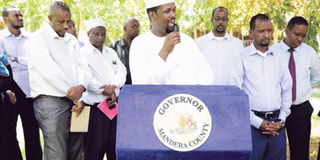Mandera Governor Ali Roba appeals for help following chaos

Mandera Governor Ali Roba addressing residents on September 1, 2014. He has appealed for assistance for residents who have been affected by recent inter-clan fighting and persistent drought. PHOTO | LUCAS BARASA | NATION MEDIA GROUP
What you need to know:
- The fighting resulted in massive displacement of people from their homes.
- Mr Roba called on the Devolution ministry and donor organisations to come to the aid of people from the county who have been displaced.
- Thousands have been displaced, 31 killed and 55 injured in the violence that started in mid-August 2014.
- Mandera’s precarious security situation has left it hugely underserved in drought-related interventions.
Mandera County Governor Ali Roba has now appealed for assistance for the residents who have been affected by recent inter-clan fighting and persistent drought that has ravaged the county.
Addressing the press on Wednesday, Mr Roba called on the Devolution ministry and donor organisations to come to the aid of people from the county who have been displaced.
Following the recent clashes pitting the Garre and Degodia clans, there was massive displacement of people from their homes.
The situation has been made worse by severe drought, which has forced people to move from their homes especially in search of water and pasture for their livestock.
He said this has put a lot of pressure on the county administration, which has so far dug 20 boreholes.
SEEK LASTING PEACE
The governor said this situation had made the path to achieving lasting peace very difficult.
He appealed to local and national leaders to help encourage the warring sides to live in harmony.
Following the inter-clan wars, 31 people have so far been killed and 55 others injured.

Grieving relatives during a burial at Ahmed Liban cemetery following inter-clan clashes between Garre and Degodia.
Thousands more have been displaced in the violence that started in mid-August 2014.
Police investigations indicated that the violence was as a result of political competition, with each clan wanting to have a dominant role.
The chaos started in Rhamu, where intense fighting was witnessed.
Heavily armed assailants then took the fight to other parts of the county, including Banisa, Chiroqo in Guba, Ogorwein and Gofa.
Besides displacing thousands of residents, the fighting has led to wanton destruction of property, including a primary school and a chief’s camp in Guba.

Burnt houses and shops in Rhamu Sub-County.
Following the inter-clan fighting, Deputy Inspector-General of Police Grace Kaindi said that the conflict pitting the Garre and Degodia was a spillover of similar skirmishes between the two communities in neighbouring Ethiopia.
Earlier last week, police launched aerial patrols over the county as the attacks continued.
A police helicopter was dispatched to provide aerial support for officers on the ground on the orders of Inspector-General of Police David Kimaiyo.
This followed intelligence reports that indicated that militia from Ethiopia were planning to cross over to the Kenyan town of Banisa to execute attacks.

A Kenya Red Cross ambulance that was attacked in Rhamu, Mandera County.
Earlier, the Kenya Red Cross had suspended its services in the county, citing safety concerns for its staff.
This followed an attack on two of the humanitarian organisation’s ambulances in Rhamu Sub-County.
During the attack near Isack Kora Village, about 15 kilometres from Rhamu Town, a crew member sustained bullet wounds in his legs, while another escaped unhurt. Police officers came to their rescue.
A second ambulance was sent to help the crew had three of its tires punctured after the assailants planted nails on the road, frustrating rescue efforts.
According to Red Cross Secretary-General Abbas Gullet, the attackers looted medical supplies and equipment, including its radio from the first vehicle.
COUNTY FACTS
Mandera County is located in north-eastern Kenya and constitutes three constituencies — Mandera West, Mandera East and Mandera Central.
It borders Ethiopia to the north, Somalia to the east and Wajir County to the south and south-west.
The main economic activity in Mandera is nomadic pastoralism. Cattle, sheep, goats and camels are the main animals reared here.
The county experiences high temperatures most of the year, averaging 28 degrees Celsius, and could sometimes go as high as 37 degrees.
According to a report released by the Agency for Technical Cooperation and Development (Acted) in 2011, Mandera’s precarious security situation has left it hugely underserved in drought-related interventions.
This is despite the fact that it is one of the counties in Kenya heavily affected by persistent drought.





